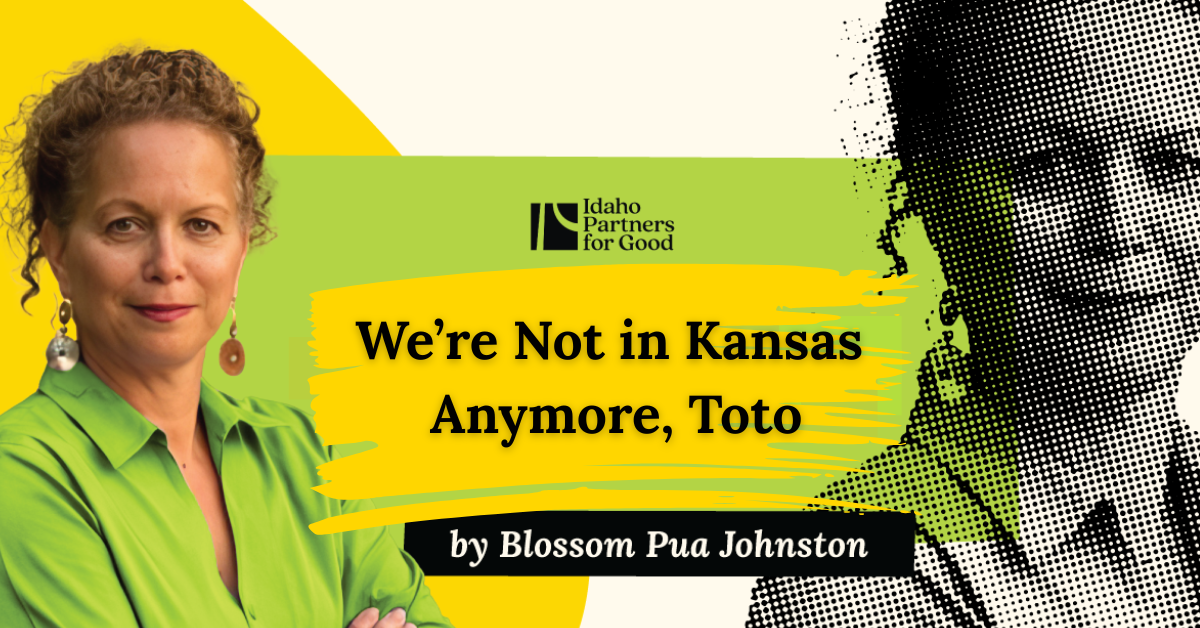We’re Not in Kansas Anymore, Toto
Lately, I’ve found myself repeating a familiar line: We’re not in Kansas anymore, Toto.
It captures the disorientation so many of us feel when we look around and realize how much the world has shifted. The daily news cycle, social media feeds, even casual conversations with friends often leave us with the same themes; disappointment, disillusionment, and confusion at realities we never thought we’d experience.
I’ll be the first to admit: I get caught in the echo chamber.
Algorithms feed me perspectives that align with my own, reinforcing what I already believe rather than challenging me to see more. That’s why I am deeply grateful for trusted people in my life who push me to think critically, dig deeper, and not settle for a quick headline or soundbite. Some days I do better than others, but I know the effort matters.
If you’re feeling the weight of disruption, you’re not alone. Families across Idaho are asking the same questions:
What happens when your job gets furloughed?
What do you do when your housing subsidy ends or food benefits are cut?
Who can you count on when your family is in crisis?
Recent events have reminded us that government systems alone cannot hold the weight of our communities’ needs. When the official safety net frays, we must ask: Who steps in?
Remembering Neighborliness
The answer might be simpler than we think. Not easy—but simple. We look back to a time when neighbors cared for neighbors, when churches fed families, regardless of membership. When those in need could count on tangible help—food, shelter, transportation—alongside moral support. When healers offered care not for payment, but for the privilege of being woven into the fabric of community life.
Can we truly return to that kind of neighborliness? Absolutely. History shows us that when people ground themselves in shared values, transformation happens. The Civil Rights Movement did not succeed because of political platforms alone, but because ordinary people chose to act out of justice, fairness, and dignity.
Grounding in Idaho Values
In Idaho today, we face threats to the basics of human dignity: food, housing, and healthcare. But we also share timeless values: protecting families, being fair, and showing up for our neighbors. These values unite us across backgrounds, politics, and perspectives. They ground us in empathy—and they give us a path forward.
Introducing the Neighbor-to-Neighbor Playbook
That’s why we created the Neighbor-to-Neighbor Playbook. It’s not about reinventing the wheel, but about rediscovering the power of community. The playbook offers practical ways to:
Reconnect with neighbors and build networks of trust.
Share resources—food, time, skills—in meaningful ways.
Strengthen community resilience so no family falls through the cracks.
Bridge divides by rooting action in shared values, not political divides.
The Idaho we want to live in is one where no child goes to bed hungry, every person has access to care when sick, and every neighbor can count on another in times of need.
That future is possible—not through big promises from far-off leaders, but through small, steady acts of neighborliness. Together, we can stitch back the fabric of community and ensure Idaho remains a place where we take care of one another—always.
Idahoans have always risen to the challenge of taking care of one another. Now is the time to rise again. The Neighbor-to-Neighbor campaign is how we reclaim what makes our communities strong: fairness, empathy, and neighborliness. Get involved today—request the playbook, share it, talk about it with your friends and family and take one step toward a stronger Idaho.

